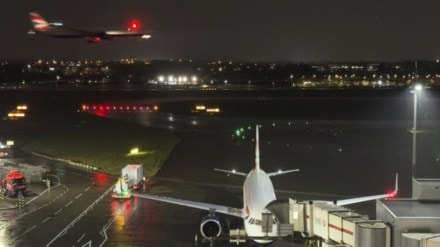The British government has launched an investigation into the country’s energy resilience following an electrical substation fire that led to an almost full-day shutdown of Heathrow Airport. The disruption has raised concerns over the UK’s ability to withstand crises affecting critical infrastructure.
Although Heathrow Airport announced it was now “fully operational,” thousands of passengers remained stranded, with airlines warning of prolonged disruptions as they scrambled to reposition planes, reassign crews, and manage delayed travel plans.
The incident has sparked outrage among passengers, airlines, and politicians, who are demanding answers on how a single fire at an electricity substation could cripple Europe’s busiest air hub.
“This is a huge embarrassment for Heathrow airport. It’s a huge embarrassment for the country that a fire in one electricity substation can have such a devastating effect,” said Labour politician Toby Harris, who leads the National Preparedness Commission, a group advocating for better resilience planning.
Government and Heathrow announce investigations
Energy Secretary Ed Miliband has tasked the National Energy System Operator with an urgent review of the fire’s impact, instructing the agency to “identify broader lessons on energy resilience for critical national infrastructure.” Initial findings are expected within six weeks.
“The government is determined to do everything it can to prevent a repeat of what happened at Heathrow,” Miliband stated.
Separately, Heathrow has launched its own review, led by former transport secretary Ruth Kelly, a member of the airport’s board. Heathrow Chairman Paul Deighton said Kelly will assess the airport’s crisis management response and recovery process.
Mass cancellations leave 200,000 stranded
More than 1,300 flights were canceled, and roughly 200,000 passengers were stranded on Friday after an overnight fire at a substation located 3.2 km away from Heathrow. The power outage also affected more than 60,000 properties.
By Saturday, Heathrow had added extra flights to accommodate an additional 10,000 passengers. British Airways, the airport’s largest carrier, said it expected to operate about 85% of its 600 scheduled flights that day. While many passengers were able to resume their journeys, others remained in limbo.
Infrastructure vulnerabilities exposed
Residents in West London reported hearing a loud explosion followed by a fireball and thick smoke when the blaze erupted at the substation. Firefighters brought the situation under control after seven hours, but the airport remained shut for nearly 18 hours.
Authorities have ruled out foul play, with the London Fire Brigade stating that the investigation will focus on the substation’s electrical distribution system. However, the incident has renewed concerns about the state of Britain’s aging infrastructure. The Labour government has pledged to address ongoing issues in transportation, water systems, and energy networks through investments in renewable energy and modernisation efforts.
“The last 40, 50 years we’ve tried to make services more efficient,” said Harris. “We’ve stripped out redundancy, we’ve simplified processes. We’ve moved towards a sort of just in time’ economy. There is an element where you have to make sure you’re available for just in case.’ You have to plan for things going wrong.”
Criticism over Heathrow’s preparedness
With 83.9 million passengers passing through Heathrow last year, the airport is one of the world’s busiest international travel hubs. Heathrow CEO Thomas Woldbye defended the airport’s response, stating, “The airport didn’t shut for days—it was closed for hours.”
He acknowledged that Heathrow’s backup power system functioned as designed, but it was not sufficient to keep the entire airport running, comparing it to how most major airports operate.
However, Willie Walsh, head of the International Air Transport Association (IATA), criticised the lack of alternative power sources, calling it a “clear planning failure.”
“How is it that critical infrastructure – of national and global importance – is totally dependent on a single power source without an alternative? If that is the case, as it seems, then it is a clear planning failure by the airport,” he said.
Walsh also pointed out that Heathrow has little financial incentive to improve, as airlines—not the airport—are responsible for passenger care during disruptions.
